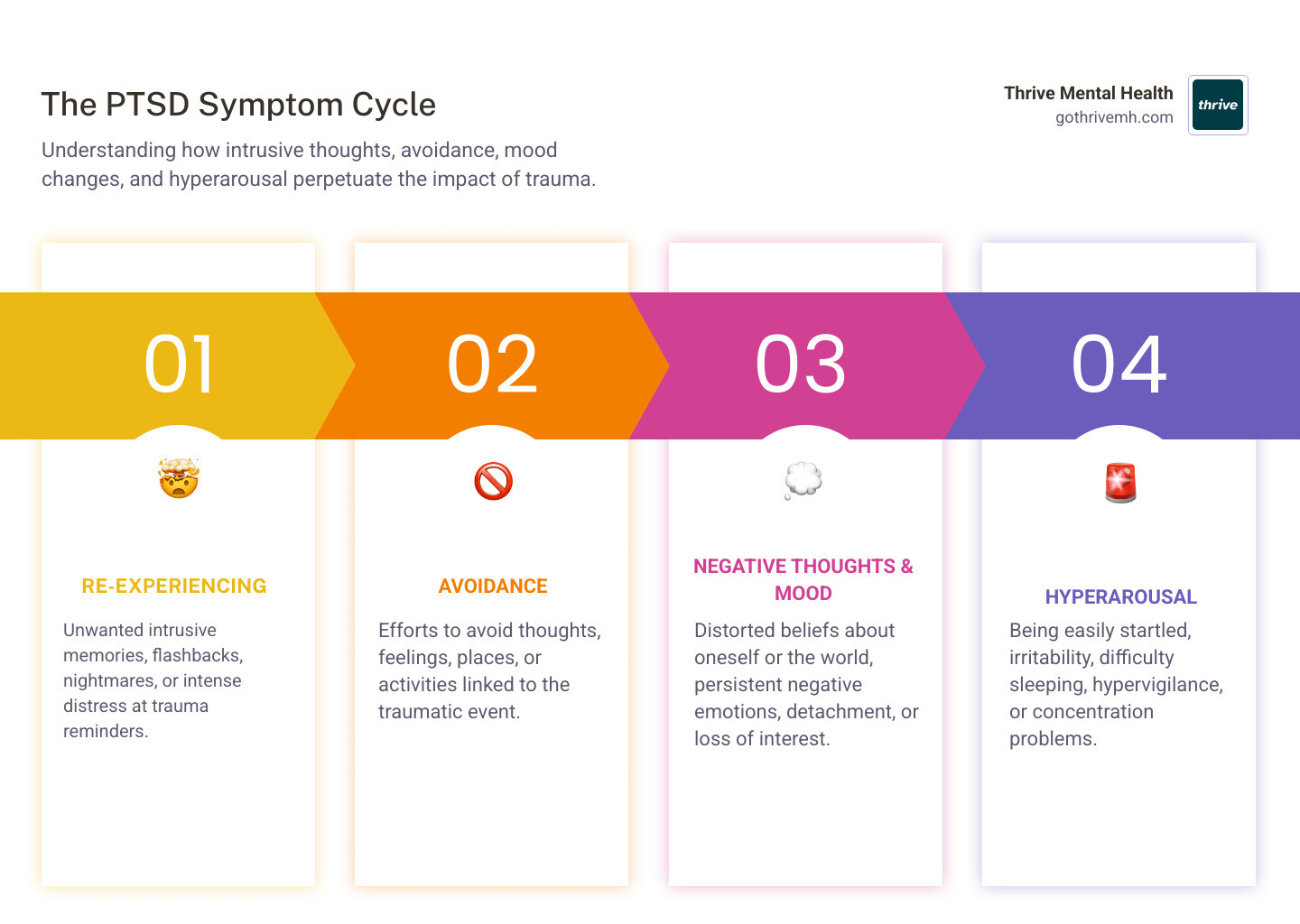Trauma Treatment Demystified – Proven Methods for Recovery

Evidence Based Trauma Treatment: 3 Healing Paths
Why Evidence-Based Trauma Treatment Matters for Your Recovery
If you or someone you know is in crisis or having thoughts of suicide, please call or text 988 to reach the Suicide & Crisis Lifeline. You are not alone.
Evidence based trauma treatment refers to therapies scientifically proven to reduce PTSD symptoms. When you’re struggling with the aftermath of trauma, choosing the right treatment can mean the difference between years of suffering and a clear path to recovery. The most strongly recommended treatments are Prolonged Exposure (PE), Cognitive Processing Therapy (CPT), and Eye Movement Desensitization and Reprocessing (EMDR).
Approximately 10-20% of people who experience trauma develop PTSD, with millions living with intrusive memories, avoidance, and hypervigilance. Many don’t realize that trauma-focused psychotherapies lead to greater and longer-lasting improvement than medication alone. For example, the average person treated with PE fares better than 86% of those in control groups, and up to 95% of completers no longer meet PTSD criteria.
Yet many people spend years in therapy that doesn’t directly address the traumatic memories, causing symptoms to persist. This guide cuts through the confusion, comparing the gold-standard treatments side-by-side and explaining how to access care that fits your life—including virtual intensive programs.
I’m Anna Green, LMHC, LPC, Chief Clinical Officer at Thrive Mental Health. I’ve seen how evidence based trauma treatment transforms lives for individuals and families across Florida when delivered with expertise and flexibility.

Understanding the “Gold Standard”: What Makes a Trauma Treatment Evidence-Based?
When you hear “evidence based trauma treatment,” it’s not about popularity—it’s about proof. These treatments have been rigorously tested in randomized controlled trials (RCTs), reviewed systematically, and proven to work across diverse populations. This process means you’re choosing an approach that has genuinely helped thousands of people before you.

First-Line vs. Second-Line Treatments for PTSD
Clinical guidelines, like those from the American Psychological Association and the VA/DoD Clinical Practice Guideline for PTSD (2023), rank treatments by the strength of their evidence.
First-line treatments are the heavy hitters with robust research showing clear effectiveness. For PTSD, these are individual trauma-focused psychotherapies: Prolonged Exposure (PE), Cognitive Processing Therapy (CPT), and Eye Movement Desensitization and Reprocessing (EMDR). Guidelines recommend these over medication as starting points due to evidence of greater, longer-lasting improvement.
Second-line treatments are conditionally recommended. They have good supporting evidence, but it may be less extensive. Examples include Cognitive Therapy, Written Exposure Therapy, and certain medications like SSRIs. Think of first-line treatments as your best bet, with second-line options as valuable alternatives.
Trauma-Focused vs. Non-Trauma-Focused Psychotherapies
The most effective PTSD treatments are trauma-focused psychotherapies—they directly address the traumatic memories, thoughts, and feelings. It may seem counterintuitive to face what you’ve been avoiding, but avoidance keeps you stuck. Trauma-focused therapies help you safely confront and process the experience, reducing its emotional grip.
In contrast, non-trauma-focused psychotherapies work on symptoms without targeting the trauma itself, focusing on general coping or relaxation skills. While helpful, research consistently shows that trauma-focused therapies lead to greater and more durable improvement in PTSD symptoms. A comprehensive meta-analysis found that among psychological treatments, trauma-focused approaches consistently outperformed others.
The bottom line: to truly heal from trauma, you need to process it. At Thrive Mental Health, our virtual IOP and PHP programs are built around these evidence-based, trauma-focused approaches, making them accessible to residents throughout Florida.
A Head-to-Head Comparison of First-Line PTSD Therapies
When you’re researching evidence based trauma treatment, you’ll quickly encounter three names that come up again and again: Prolonged Exposure, Cognitive Processing Therapy, and EMDR. These aren’t just popular options—they’re the therapies with the strongest scientific backing for treating PTSD.
Each takes a different path to the same destination: helping you process your traumatic experience safely and reducing its grip on your daily life.
| Treatment Modality | Typical Length | Core Technique | Main Focus | Ideal Candidate |
|---|---|---|---|---|
| Prolonged Exposure (PE) | 8-15 sessions | Imaginal & In-vivo Exposure | Directly confronting trauma memories & reminders to reduce avoidance and fear. | Individuals ready to directly engage with trauma memories and situations they’ve avoided. Effective for various trauma types. |
| Cognitive Processing Therapy (CPT) | 12 sessions | Challenging “Stuck Points” & Maladaptive Beliefs | Modifying unhelpful thoughts and beliefs about the trauma, self, others, and the world. | Individuals who struggle with negative thoughts and beliefs stemming from trauma, and are open to examining and challenging their cognitive patterns. |
| Eye Movement Desensitization and Reprocessing (EMDR) | 6-12+ sessions | Bilateral Stimulation with Trauma Recall | Reprocessing distressing memories and reducing their emotional intensity through guided bilateral stimulation. | Individuals who find it difficult to process trauma through purely verbal means, or those with single-incident traumas. Can also be adapted for complex trauma. |
Prolonged Exposure (PE): Facing What You’ve Avoided
Prolonged Exposure therapy is built on the insight that avoiding trauma-related memories and situations keeps you stuck. PE helps you gradually face them in a safe environment to break the cycle of fear. The therapy has two main components:
- Imaginal exposure: Recounting the traumatic memory in detail during sessions. As you revisit the memory repeatedly in a safe context, its emotional intensity decreases through a process called habituation.
- In-vivo exposure: Gradually approaching real-world situations or places you’ve been avoiding because they remind you of the trauma. This teaches your brain that these situations are safe now.
Backed by impressive research, PE helps the average person fare better than 86% of those in control groups, with 41-95% of completers no longer meeting PTSD criteria. It’s ideal for those ready to directly engage with trauma memories and is effective for various trauma types.
Cognitive Processing Therapy (CPT): Rewriting Your Trauma Story
Trauma changes how you think about yourself, others, and the world. CPT, a powerful evidence based trauma treatment, focuses on identifying and changing these unhelpful thoughts, or “stuck points.”
Stuck points are distorted beliefs like “It was my fault” or “I can never trust anyone again.” CPT uses structured worksheets and Socratic questioning to help you examine the evidence for and against these beliefs. You’ll learn to develop more balanced perspectives, such as shifting from “It’s my fault” to “I did the best I could with what I knew.” The therapy often includes writing about the trauma to identify and challenge problematic thoughts and emotions.
Typically spanning 12 sessions, CPT leads to significant, long-lasting reductions in PTSD, depression, and anxiety. It’s a great fit if you’re caught in negative thought spirals and are open to a structured, cognitive approach.
Eye Movement Desensitization and Reprocessing (EMDR): Helping Your Brain Heal Itself
EMDR is a unique and highly effective evidence based trauma treatment. It’s based on the theory that trauma can overwhelm the brain’s natural information processing system, leaving the memory “stuck” in a raw, distressing state.
EMDR uses bilateral stimulation—typically side-to-side eye movements, sounds, or taps—while you focus on a traumatic memory. This stimulation seems to help the brain reprocess the memory, reducing its emotional charge and vividness without requiring you to talk about it in exhaustive detail. The therapy follows a structured eight-phase protocol to ensure you feel safe and grounded throughout the process.
Meta-analyses consistently show EMDR’s effectiveness, with many people experiencing significant relief in 6-12 sessions. It is particularly helpful for those who find purely verbal processing difficult and can be adapted for both single-incident and complex trauma.
At Thrive Mental Health, our Florida-licensed clinicians are trained in these evidence-based approaches and will work with you to determine which therapy—or combination of therapies—best fits your needs, preferences, and trauma history.
Key Factors in Your Recovery Journey
Choosing an evidence-based therapy is the first step. Your healing path also involves the right support, specialized approaches for complex histories, and the human connection that makes change possible.

The Role of Medication in Evidence-Based Trauma Treatment
While medication can help manage PTSD symptoms, psychotherapy consistently delivers better and longer-lasting results. The VA/DoD Clinical Practice Guideline (2023) recommends trauma-focused psychotherapies like PE, CPT, and EMDR over medication as the primary treatment.
When prescribed, medications like SSRIs (Sertraline, Paroxetine) or SNRIs (Venlafaxine) can reduce anxiety, depression, and hyperarousal. Think of medication as an adjunct to therapy—a tool to stabilize your symptoms enough to engage in the deeper work of trauma processing. Any medication should be part of a comprehensive plan that prioritizes psychotherapy, which is why Thrive Mental Health integrates medication management with our intensive outpatient programs for Florida residents when appropriate.
Special Considerations for Complex and Developmental Trauma
Repeated or early-life trauma, such as childhood abuse or domestic violence, can lead to complex trauma or Complex Post-Traumatic Stress Disorder (C-PTSD). Beyond core PTSD symptoms, C-PTSD involves profound difficulties with emotional regulation, self-worth, and relationships.
Treating complex trauma requires a phased approach. We don’t rush into processing memories. First, we focus on stabilization and safety, building the emotional regulation skills and internal resources you need. This foundational phase is crucial and often takes longer. Once you’re stable, we move to trauma processing using adapted modalities like PE, CPT, or EMDR. The final phase is integration, helping you build a coherent identity and healthier relationships.
This process is guided by trauma-informed care, emphasizing safety, trust, and collaboration to prevent re-traumatization. For more on this topic, see Treating complex traumatic stress disorders in adults.
The Power of the Therapeutic Relationship
The techniques matter, but the relationship often matters more. A strong therapeutic alliance is a powerful predictor of successful treatment outcomes, especially for trauma survivors. When trauma shatters your ability to trust, the therapy relationship becomes a safe haven where healing can begin.
A strong therapeutic relationship is built on trust, consistency, and empathy. It provides a corrective emotional experience—living proof that relationships can be safe and that your experiences matter. At Thrive Mental Health, our clinicians combine expertise in evidence-based modalities with the warmth and genuine connection necessary for healing, whether in our virtual programs available across Florida or our partial hospitalization program.
Navigating Your Path to Healing
Making an informed choice is the first step. This section covers practical considerations for starting your journey and what to do if your initial path needs adjustment.

How to Choose the Right Therapy and What to Do If It Doesn’t Work
Choosing the right therapy is deeply personal. Your preferences, cultural background, and values all play a role. Some people prefer the structured, logical approach of CPT, while others connect with the experiential nature of EMDR. The best therapy is the one that resonates with you.
But what if you try an evidence based trauma treatment and it’s not clicking? This isn’t failure—it’s a sign we need to adjust the plan. We might start with a re-assessment to check for co-occurring conditions, or we might switch to a different modality. If PE feels overwhelming, CPT might be a better fit. If verbal processing is difficult, EMDR could be the answer.
Other augmentation strategies include adding DBT skills training for emotional regulation or incorporating medication. Sometimes, a more intensive level of care, like an Intensive Outpatient Program (IOP) or Partial Hospitalization Program (PHP), provides the necessary momentum. The key is to remain flexible; recovery isn’t a straight line.
Accessing Care: Insurance and Program Options
Finding the right evidence based trauma treatment shouldn’t be an obstacle course. Most major insurance plans cover evidence-based mental health care, including intensive programs like IOP and PHP. We work directly with Cigna, Aetna, Florida Blue, Optum, and UnitedHealthcare, among others. You can verify your insurance benefits with us in minutes, with no obligation.
Virtual care makes expert treatment accessible from your own home, whether you’re in Miami, Orlando, Tampa, or anywhere else in Florida. Research confirms telehealth for trauma is just as effective as in-person care. Thrive Mental Health specializes in providing these services to Florida residents through virtual and hybrid Intensive Outpatient (IOP) and Partial Hospitalization (PHP) programs.
Our IOP programs offer structured therapy several days a week while you live at home, and our PHP programs provide more intensive support without overnight stays. We offer these programs to all Florida residents, with evening options because healing shouldn’t require you to put your life on hold. Every program is built around personalized, evidence-based care designed to fit your life.
Learn about our Florida Trauma Treatment Programs to see how our flexible approach can support your recovery journey.
Frequently Asked Questions about Evidence-Based Trauma Treatment
The following is for informational purposes and is not a substitute for professional medical advice. The answers provided are based on current clinical research.
What is the most effective evidence-based treatment for trauma?
The most effective and strongly recommended evidence based trauma treatment for PTSD are trauma-focused psychotherapies, including Prolonged Exposure (PE), Cognitive Processing Therapy (CPT), and Eye Movement Desensitization and Reprocessing (EMDR). While all are highly effective, there isn’t a single “best” therapy; the ideal choice depends on an individual’s specific symptoms, trauma history, and personal preference.
How long does evidence-based trauma therapy take?
The duration of evidence based trauma treatment varies. Cognitive Processing Therapy (CPT) is typically completed in 12 sessions. Prolonged Exposure (PE) usually takes 8 to 15 sessions. Eye Movement Desensitization and Reprocessing (EMDR) can range from 6 to 12 sessions or more. Treatment for complex or chronic trauma may require a longer duration to ensure stabilization before processing.
What are emerging treatments for PTSD?
Emerging treatments for PTSD, such as MDMA-assisted therapy and ketamine-based therapies, are showing promise in clinical trials but are not yet considered standard first-line treatments. They are still under investigation to establish their long-term safety, efficacy, and the specific populations they may benefit. Currently, the limitations of current evidence mean they are typically considered for individuals who have not responded to established evidence based trauma treatment.
Conclusion: Take the First Step Toward Recovery with Confidence
The path through trauma doesn’t have to be walked alone. Evidence based trauma treatment offers a clear, scientifically validated route to healing. The first-line therapies—Prolonged Exposure (PE), Cognitive Processing Therapy (CPT), and Eye Movement Desensitization and Reprocessing (EMDR)—represent decades of research and real-world success.
Recovery is genuinely possible. The statistics are not just numbers; they represent people who found their way through with the right support. These therapies work, and they can work for you. What matters most is taking that first step. If one approach doesn’t feel right, we can adjust. Your recovery journey is unique, and treatment should be flexible enough to meet you where you are.
At Thrive Mental Health, we believe expert-led, evidence-based care should fit your life. Our virtual and hybrid IOP/PHP programs bring gold-standard therapies to you, right here in Florida, with flexible evening options. We combine proven methods with the warmth and individualized attention that makes healing possible for our clients across the state.
You’ve already taken an important step by educating yourself. Now, take the next one.
Ready for support in Florida? Thrive offers virtual and hybrid IOP/PHP with evening options. Verify your insurance in 2 minutes (no obligation) → Start benefits check or call 561-203-6085. If you’re in crisis, call/text 988.